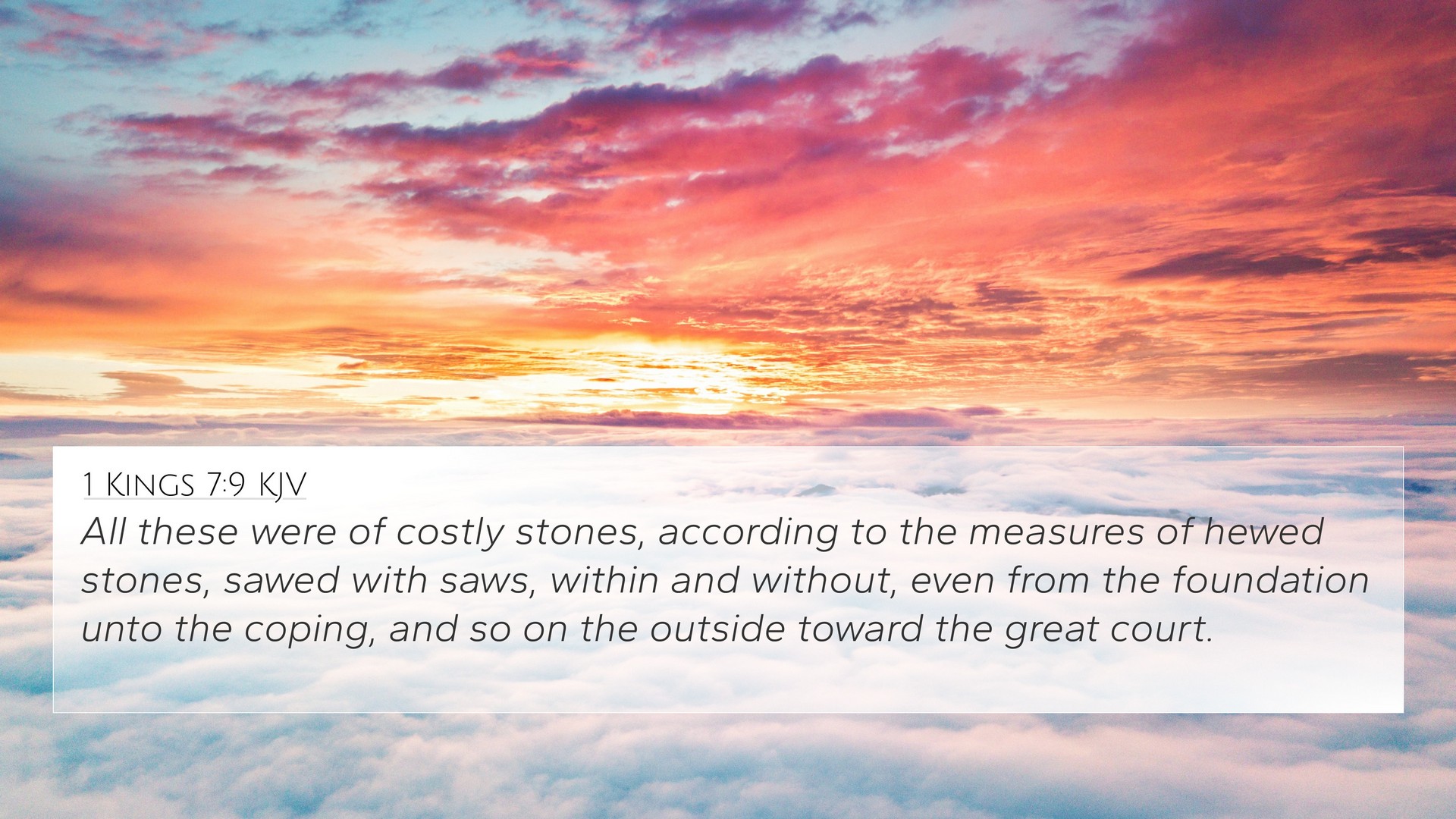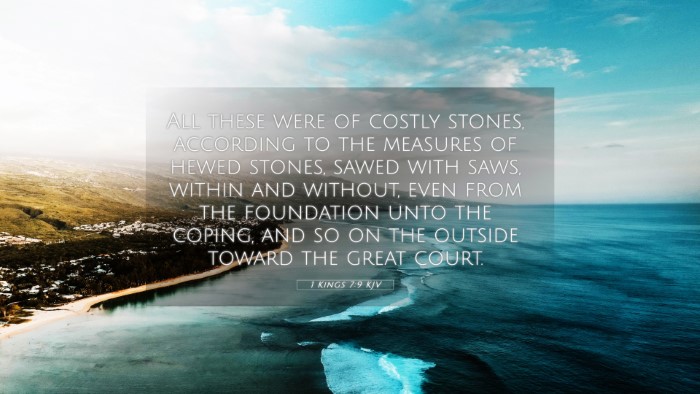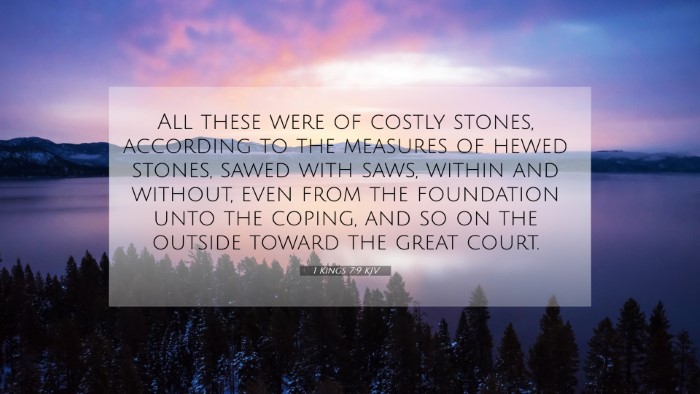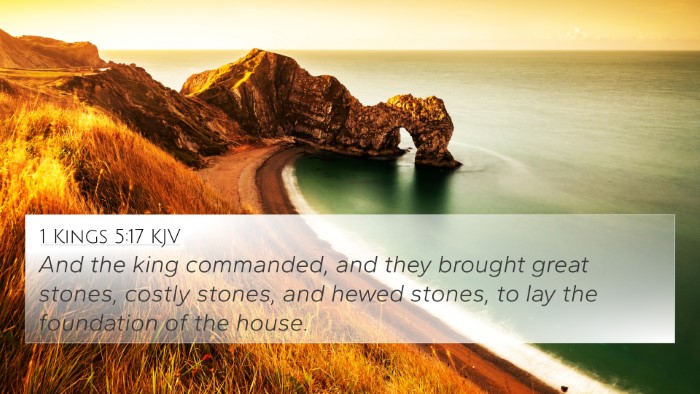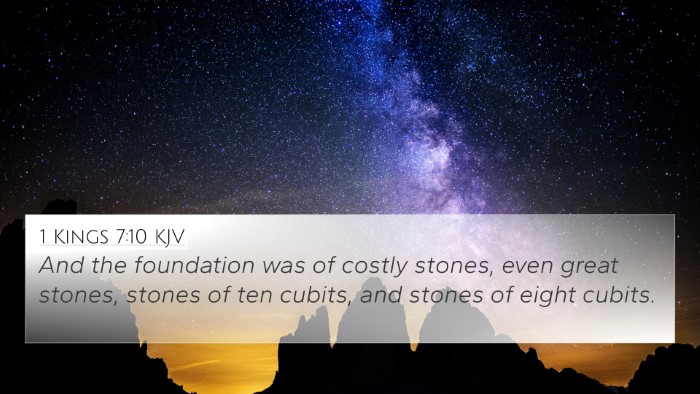Understanding 1 Kings 7:9: A Comprehensive Analysis
Verse: 1 Kings 7:9 - "All these were of costly stones, according to the measures of hewed stones, sawed with saws, within and without, even from the foundation unto the coping, and so on the outside toward the great court."
This verse describes the grandeur and meticulous craftsmanship involved in the construction of the temple built by Solomon. It underscores the importance of quality materials and precise measurements in the building's design. The mention of "costly stones" reflects the value placed on sacred spaces in the biblical tradition, emphasizing the efforts taken to create a dwelling place for God.
Significance of 1 Kings 7:9
The verse is part of a larger narrative concerning the construction of the Temple in Jerusalem. Various public domain commentaries, such as those by Matthew Henry, Albert Barnes, and Adam Clarke, provide deeper insights into the implications of this passage:
- Matthew Henry: Henry highlights the symbolic representation of the temple as a place of worship, indicating that its foundation is laid on precious spiritual truths. The costly stones symbolize the value of God’s presence among His people.
- Albert Barnes: Barnes remarks on the precision and the elaboration of the building process, illustrating God’s order and perfection. He suggests that the meticulous details serve as a model for how future temples or places of worship should be approached—with care and reverence.
- Adam Clarke: Clarke points out the historical significance of Solomon's Temple, emphasizing the advancements in construction techniques showcased in this verse. He also connects the building efforts to the themes of Israel's national identity and unity under God.
Cross-References and Thematic Connections
This verse offers a gateway to explore various biblical themes and narratives through cross-referencing. Here are several notable verses that share similar themes with 1 Kings 7:9:
- Exodus 25:8-9 - God commands the Israelites to build a sanctuary for Him, highlighting the importance of holy spaces.
- 1 Chronicles 22:2 - This verse discusses the preparation of materials for the temple, echoing the emphasis on costly and chosen elements.
- 2 Chronicles 3:1 - Depicts the foundational work of the temple, further illustrating the significance of its construction.
- Matthew 21:12-13 - Jesus cleanses the temple, showing the importance of maintaining sacred spaces for worship.
- Hebrews 9:24 - Speaks of a greater heavenly sanctuary, connecting the physical temple to spiritual realities.
- Revelation 21:22 - Envisions a new Jerusalem, not needing a temple, pointing to a future where God dwells directly with humanity.
- Psalm 84:1-2 - Expresses a longing for the courts of the Lord, emphasizing the emotional connection to sacred spaces.
Insights from Cross-Referencing
In studying 1 Kings 7:9 through cross-referencing, one can observe several key themes:
- The Importance of Sacred Spaces: From the instructions for building the Tabernacle in Exodus to the elaborate description of Solomon's Temple, the Bible consistently emphasizes creating spaces dedicated to the worship of God.
- Quality and Sacrifice: The use of costly materials serves as a metaphor for the offering of our best to God—suggesting that worship is not only a spiritual act but also one reflected materially.
- God’s Presence: The temple serves as a focal point of God’s presence among His people. This theme links Jewish worship practices to later Christian interpretations of the temple as a representation of Jesus Christ and His body.
Methodology for Cross-Referencing
For those interested in studying the connections between Bible verses, utilizing tools for Bible cross-referencing can be incredibly beneficial. Here are some methods for effective cross-referencing:
- Bible Concordances: Use a concordance to find related verses based on keywords or themes present in 1 Kings 7:9.
- Bible Reference Resources: Develop a comprehensive understanding by consulting textbooks or guides focused on biblical architecture and worship practices.
- Scriptural Cross-Referencing: Engage in thematic studies that connect Old Testament practices with New Testament fulfillments.
Conclusion
1 Kings 7:9 presents a detailed glimpse into the grandeur and significance of the Temple's construction, symbolizing the relationship between God and His people. Through careful study and cross-referencing, one can uncover a rich tapestry of biblical themes related to worship, quality, and God’s everlasting presence.
Thus, by evaluating the connections between this verse and others, one gains deeper insights into the beauty of the Scriptures and how they continuously interact through various narratives. Whether through direct connections or thematic echoes, the Bible remains a cohesive narrative that reveals the heart of God for humanity.
